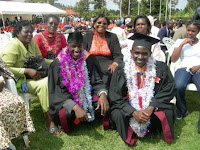The entire week before the village director left for Nairobi for other assignments, we were held up in an SOS family meeting with one of our girls on her future prospects. She informed us of her intention to get married and indicated that there was a man who had proposed to marry her and that she had consented, but needed our blessings.
The next morning I received a call from the Village Director asking me to facilitate in the negotiation on his behalf. He informed me that the elders from the man’s side had sent word that they want to visit and have a meeting with the SOS Family. Because he was held up elsewhere, he was requesting that I stand in his stead. Unsure of exactly what I was going to do and what sort of questions to ask and expect, I put on my suit.
Again I was unsure of the day’s events and got fairly obscure explanations when I asked, so by the time I arrived in Mama Ngudi’s living room I decided I should stop asking questions and just go along with whatever was going to happen.

The entourage comprised 12 members from the man’s family and elders of the extended family. They were met by the SOS family who had also by that time called their group of elders led by the school Principal and another teacher, as part of the negotiation team from the girl’s side. The visitors brought small gifts of dry foods such as rice, wheat, sugar, tea, cooking oil, etc. This is a common practice when one visits any family, and so this is not part of the dowry.
The SOS family house was modest, fairly furnished with large sofa sets. A small radio sat in a large wooden shelf, playing gospel music. I found a comfy space on a couch next to the Principal who was chairing the meeting. Soon it was time to file up and fill our plates with food. After washing our hands in some hot water, then plates in hand, we walked down the row of dishes, having heaps of local favourites piled high on our plates.
After the food and the warm welcome, the elders of the man said something like this. We have an interest in one of your "sheep", and we would like to bring her to our homestead. This is when I got my first inclination that the event was more than just an eating y and familiarization activity. The talking was done only by the elders and it is a taboo for the young man to speak and in doing so, he could seriously jeopardize the negotiations.
In the cause of the negotiation, I learnt that dowry is not about buying the bride from her family. It is a test for compatibility. Compatibility of the two families involved. It proves that the two families can discuss, even argue about an issue and come to a consensus. It also shows to what extent the groom is willing to humble himself before his in-laws and how much he is willing to sacrifice for his love.
Hardly any wedding takes place in Africa with no dowry having been paid. Even church weddings are a culmination of successful dowry negotiations. In fact some churches in Africa will not officiate a wedding if the groom has not paid bride price or the bride’s parents have pending issues.
by Fredrick Ochieng - youth leader coordinator







 The two graduates, James and Michael, expressed their sincere appreciation and were thankful to the organization for enabling them go through their education from the kindergarten to the SOS Herman Gmeiner International College and now the Kenya Methodist University where they graduated with Bachelors of Business Administration in Human Resources and Management Information Systems respectively. For them, this was an accomplishment worthy of celebration. And there was no better time than now to their caregivers and teachers, whose love and support brought them to this day.
The two graduates, James and Michael, expressed their sincere appreciation and were thankful to the organization for enabling them go through their education from the kindergarten to the SOS Herman Gmeiner International College and now the Kenya Methodist University where they graduated with Bachelors of Business Administration in Human Resources and Management Information Systems respectively. For them, this was an accomplishment worthy of celebration. And there was no better time than now to their caregivers and teachers, whose love and support brought them to this day. 





























